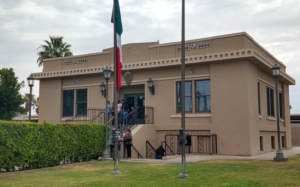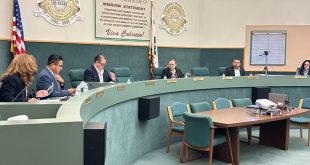
By: Mario Beltrán Mainero
Consul for Community and Political Affairs at the Consulate of Mexico in Calexico
Mexico has 50 consulates in the United States, in addition to the Consular Section of the Embassy of Mexico in Washington, D.C. Out of these 51 consular offices (which conform to the largest consular network of any country in another country), 12 are located in the U.S.-Mexico border area.
These consulates are especially important due to a very specific reason: they are in charge of verifying that the repatriation of Mexican nationals who are returned to Mexico by U.S. immigration authorities through the border is carried out in a safe manner and with respect to the human rights of immigrants.
But, beyond these immigration issues, which now also involve supervising the return of foreign migrants—particularly from Central America—to Mexico where they wait for the development of their asylum processes in U.S. immigration courts, border consulates have one more particularity: they serve regions that are naturally binational.
Due to the geographical proximity and the historical conformation of border territories, the southern part of the United States is inhabited by populations with a high percentage of Mexican origin. Many of the residents of these zones, even though they are fully assimilated in their respective communities, are active users of Mexican consulates. Whether to obtain documents like the Mexican passport, to participate in cultural events or even to obtains scholarships from the Mexican Government, these individuals benefit from the intense work of border consulates.
 Furthermore, border consulates have a special mission: they perform as links between the peoples of both sides of the division line. This, for example, is particularly evident in the very dynamic region of Cali-Baja. The consulates of Mexico in San Diego and Calexico don’t only focus on providing services to the Mexican communities that live within their jurisdictions in the United States, but they also function as liaisons between political, economic, social and cultural actors of Tijuana-San Diego and Mexicali-Imperial County, respectively.
Furthermore, border consulates have a special mission: they perform as links between the peoples of both sides of the division line. This, for example, is particularly evident in the very dynamic region of Cali-Baja. The consulates of Mexico in San Diego and Calexico don’t only focus on providing services to the Mexican communities that live within their jurisdictions in the United States, but they also function as liaisons between political, economic, social and cultural actors of Tijuana-San Diego and Mexicali-Imperial County, respectively.
Border consulates participate, through their good offices and local diplomacy, in the search for joint solutions to shared problems. These problems are related to a variety of issues such as health, the environment, security or the development of infrastructure to improve cross-border traffic. These subjects transcend borders and they need binational cooperation for their resolution. Therefore, border consulates gain considerable importance as they facilitate dialogue between key actors of both countries.
On the other hand, border consulates also benefit from the academic and cultural realities that exist on the Mexican side. In the case of the Consulate of Mexico in Calexico, having the city of Mexicali as a neighbor is very fortunate. Counting with the support of renowned public institutions such as the Autonomous University of Baja California (UABC) as well as other private ones allows presenting to the community of Imperial Valley a great offer of academic and cultural activities that are not usually found on the American side. This strengthens the bonds of migrants of Mexican origin with Mexico and helps to show to the American people the richness of Mexico’s people and traditions.
Mexico has an internationally renowned consular policy. Border consulates play a fundamental role in that effort.





